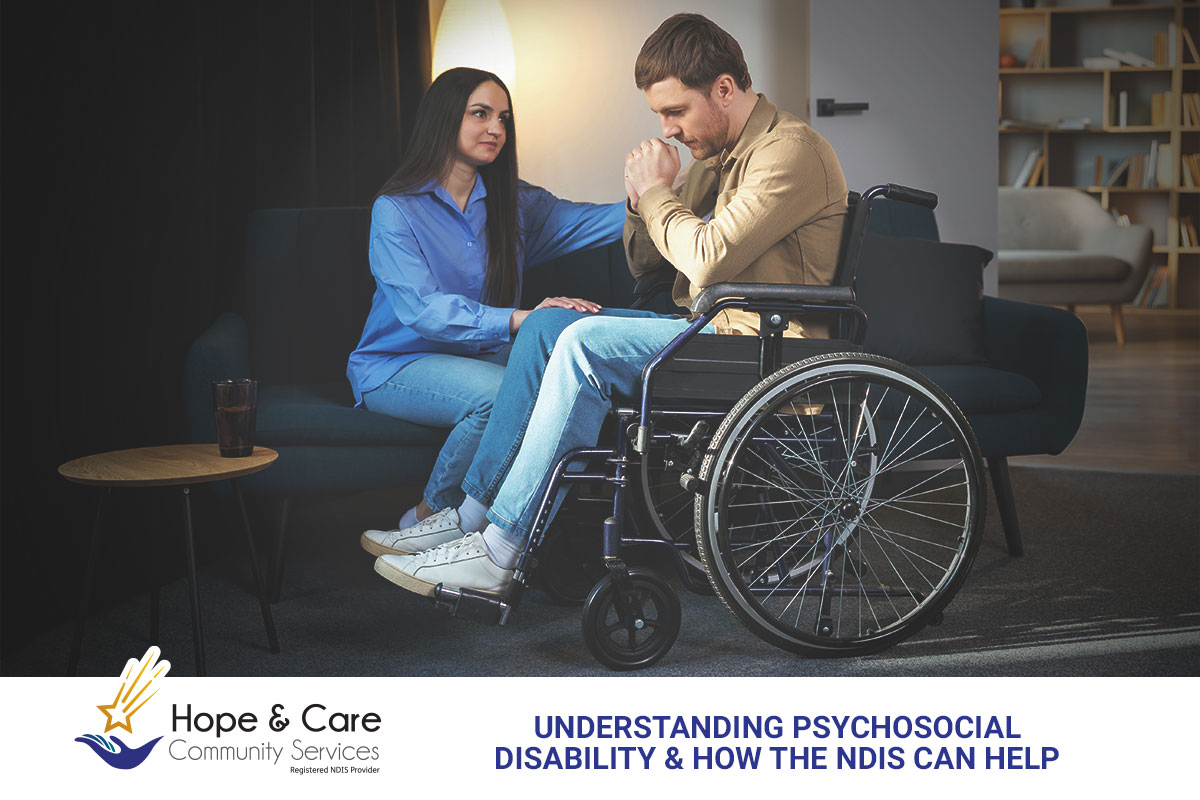
Psychosocial disability affects countless Australians by creating barriers to daily life. It arises from mental health conditions that impact an individual’s ability to engage in work, education, relationships, and self-care. Fortunately, the National Disability Insurance Scheme (NDIS) offers critical support to help individuals overcome these challenges and reclaim their independence.
At Hope & Care Community Services, we are committed to empowering individuals with psychosocial disabilities through tailored services. In this article, we will explore what psychosocial disability means, highlight the benefits of NDIS support, and show how you or a loved one can access life-changing assistance.
What is Psychosocial Disability?
Psychosocial disability results when mental health conditions create functional limitations in a person’s daily life. Unlike physical disabilities, psychosocial disabilities are often invisible but can have equally significant impacts.
Here are some examples of how psychosocial disability can affect individuals:
- Social Life: Many struggle to form or maintain relationships.
- Employment and Education: Some face challenges in securing a job or completing educational programs.
- Everyday Activities: Routine tasks like personal care, cooking, or running errands may feel overwhelming.
However, not every person with a mental health condition will experience a psychosocial disability. For those who do, the right support can transform their ability to live a fulfilling life.
What Causes Psychosocial Disability?
Psychosocial disability is closely linked to mental health conditions. These conditions can vary widely in how they affect individuals, but the most common causes include:
Schizophrenia and Related Disorders: These conditions disrupt thinking, perception, and emotional stability.
Anxiety Disorders: Disorders such as obsessive-compulsive disorder (OCD), post-traumatic stress disorder (PTSD), and agoraphobia can cause avoidance behaviours and severe anxiety in daily life.
Mood Disorders: Major depressive disorder and bipolar disorder often result in prolonged sadness or dramatic mood swings that hinder normal functioning.
Personality Disorders: Conditions like borderline personality disorder can cause emotional instability and challenges in maintaining healthy relationships.
Understanding the connection between these mental health conditions and their effects is the first step in finding effective support.
How Does the NDIS Help with Psychosocial Disability?
The NDIS offers tailored services to help individuals with psychosocial disabilities live independently and achieve their goals. By focusing on each person’s unique needs, the scheme provides practical solutions to everyday challenges.
Here’s how the NDIS makes a difference:
Building Independence Through Capacity Supports
The NDIS funds capacity-building programs that teach skills to help participants live more independently. These supports include:
- Learning how to manage daily routines.
- Gaining social and communication skills for better interactions.
- Accessing training or education programs to build confidence and job readiness.
Offering Guidance with Psychosocial Recovery Coaches
Recovery coaches work one-on-one with participants to help them manage challenges caused by mental health conditions. Their role involves:
- Developing personalised strategies to build resilience.
- Offering emotional support during tough times.
- Connecting individuals with mental health services and community resources.
Recovery coaches focus on creating a strengths-based approach that prioritises the participant’s abilities and aspirations.
Providing Access to Allied Health Professionals
NDIS funding can also cover therapeutic services delivered by qualified health professionals, including:
- Occupational Therapists: These experts help adapt living spaces and develop tools for easier daily living.
- Psychologists and Counsellors: They offer strategies for coping with emotional stress and improving mental health.
- Speech Therapists: For individuals whose mental health conditions affect communication, these specialists provide tools to enhance verbal and non-verbal expression.
Funding Assistive Technologies
Participants can also access funding for assistive technologies like communication devices, calming tools, or mobility aids. These technologies play a vital role in promoting independence and reducing stress in everyday life.
Who Can Access NDIS Support for Psychosocial Disability?
To access NDIS services, individuals must meet specific eligibility criteria. The main focus is on whether the mental health condition creates a substantial and enduring impact on daily functioning.
Key criteria include:
- The condition must be permanent or long-term.
- It must significantly limit a person’s ability to perform essential tasks like self-care, mobility, or communication.
- The person must need additional support to manage these limitations.
What About Episodic Conditions?
Some mental health conditions, like bipolar disorder, involve periods of recovery and relapse. Even if symptoms are not constant, the NDIS considers the overall impact on a person’s life. This means individuals with episodic conditions may still qualify for support.
Benefits of NDIS Support for Psychosocial Disabilities
Accessing the NDIS can be life-changing for people with psychosocial disabilities. Here’s why:
- Improved Mental Well-being: Therapy and recovery-focused programs help reduce stress and build coping skills.
- Increased Independence: Participants gain the skills to manage daily tasks and live with greater self-reliance.
- Enhanced Social Connections: Supports like group activities or communication training make it easier to form meaningful relationships.
- Opportunities for Growth: With the right support, individuals can pursue education, find employment, or contribute to their communities.
How Hope & Care Community Services Helps You Thrive
At Hope & Care Community Services, we specialise in empowering individuals with psychosocial disabilities. We focus on creating personalised services that align with your unique goals and aspirations.
Here’s what makes us different:
- Tailored Solutions: We design support plans that reflect your individual needs and circumstances.
- Experienced Professionals: Our team includes recovery coaches, therapists, and counsellors dedicated to helping you succeed.
- Holistic Approach: We integrate mental health support, skill-building, and social opportunities to ensure comprehensive care.
Take the First Step Towards a Brighter Future Psychosocial disability does not have to limit your potential. With the right support from the NDIS and compassionate guidance from Hope & Care Community Services, you can overcome barriers, build confidence, and achieve your goals.
Want to learn more? Read other articles :
- Redefine Independence your own way – with HCCS
- Who’s Who: The Key Terms of Your NDIS Plan
- Foundational Supports: Building Blocks of NDIS Success
HCCS is a registered NDIS provider. Learn more about our services.
♥ We are available in Brisbane! – Our team is just a call away!
